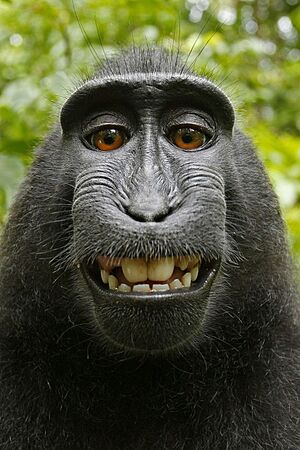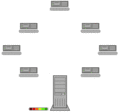Copyright infringement facts for kids
Copyright infringement happens when someone uses creative work that is protected by copyright law without permission. This means they use it in a way that goes against the original owner's special rights. These rights include making copies, performing the work, or creating new works based on it. Sometimes, people call illegally copied movies or music "piracy".
Some people, like Richard Stallman, say we shouldn't call copying "piracy". They argue that real piracy involves attacking ships and stealing, which is much worse. However, courts sometimes allow the word "piracy" for serious copyright violations.
Contents
Why do people infringe copyright?
People break copyright rules for a few reasons. Copied goods are usually cheaper than legal ones. This is because the people selling them don't have to pay the original creators. This makes the copied items easier to sell. Sometimes, legal versions of a product might also have limits that copied ones don't.
Internet and copyright
Copyright laws have tried to keep up with new technologies like the internet. Today, many people upload articles, music, or videos to websites. These sites let others read or watch for free without the creator's permission. This makes it easy for many people to access content. However, it is against the law. Because of this, many creators take legal action against these websites.
Common ways copyright is broken
Here are some common ways people break copyright rules:
- Making copies or photocopies of protected work.
- Letting many people see or use copyrighted material for free in public.
- Sharing or selling copied work after changing it.
How copyright infringement harms others
Copied goods are often cheap because no one paid for the copyright or for research. This makes them popular with people who don't know much about copyright. At first, it might seem like it helps stop big companies from having too much control. But actually, it's a type of unfair competition. It hurts the fair way businesses should compete. It can also harm smaller companies.
Why some people support sharing
There are some benefits to society when copyright is less strict. One benefit is that more people can read newspapers and books. For example, newspapers used to be expensive. But copies were often free in coffee houses across Europe. Public libraries also helped make books available to everyone. Many smart people in the past, like Michael Faraday, came from poor families. They didn't go to university but used libraries to learn.
Copyright law tries to find a balance. It aims to protect the rights of creators and publishers. But it also wants to meet the broader needs of society for knowledge and access.
Real-life examples
Here are some famous cases of copyright infringement:
Writers vs. Baidu (2011)
On March 15, 2011, many famous writers, including HanHan, sued Baidu Library. They said Baidu allowed people to read and download their articles for free. The writers asked Baidu to pay them, but Baidu refused.
Princeton University Press v. Michigan Document Services (1996)
Michigan Document Services made study packets for university students. A professor gave them course material. The company then photocopied the material and made booklets to sell to students.
In this case, there was a rule called "Fair use." The photocopying company could have paid a small fee to the university to use the material. This fee was available to anyone. However, the company only paid for the original copy. Then they started making many photocopies. The court decided this was not "fair use" and punished the photocopying company.
A & M Records vs. Napster (2001)
This is a very well-known case about music copyright. As peer-to-peer file sharing grew, Napster started a website. This site offered free downloads of songs of all types. You might even know someone who used it.
A & M Records and other music companies sued Napster. They said Napster was stealing music and making it available worldwide. Before closing its site in 2002, Napster had to pay $26 million to different music companies and songwriters. It could have been even more if Napster hadn't apologized and shut down. Even after Napster, many websites still offer free music downloads. The music industry faces the most copyright infringement cases. The Napster case showed the consequences, but it didn't stop other music sites from offering free downloads.
Public opinions on free content
Many people think it's easy and cheap to read books and articles online for free. They believe free content is good for them. On the other hand, some people think it's wrong to offer free downloads without the author's permission. They believe the best way to solve this is to pay for reading online.
Monkey selfie copyright case
In 2014, selfies taken by a crested black macaque caused a legal discussion. A nature photographer, David Slater, had his camera taken by a group of macaques. One of them took photos. When these photos were uploaded to Wikipedia, the Wikimedia Foundation refused to remove them. They said the photos were in the public domain. This was because a non-human animal took them, so there was no human author to own the copyright.
Images for kids
-
A pirated edition of German philosopher Alfred Schmidt (Amsterdam, around 1970).
-
The BitTorrent protocol: Pieces of a file are shared from one computer to another. The original sender only needs to send one copy for everyone to get it.
See also
 In Spanish: Infracción de derechos de autor para niños
In Spanish: Infracción de derechos de autor para niños
 | Misty Copeland |
 | Raven Wilkinson |
 | Debra Austin |
 | Aesha Ash |





